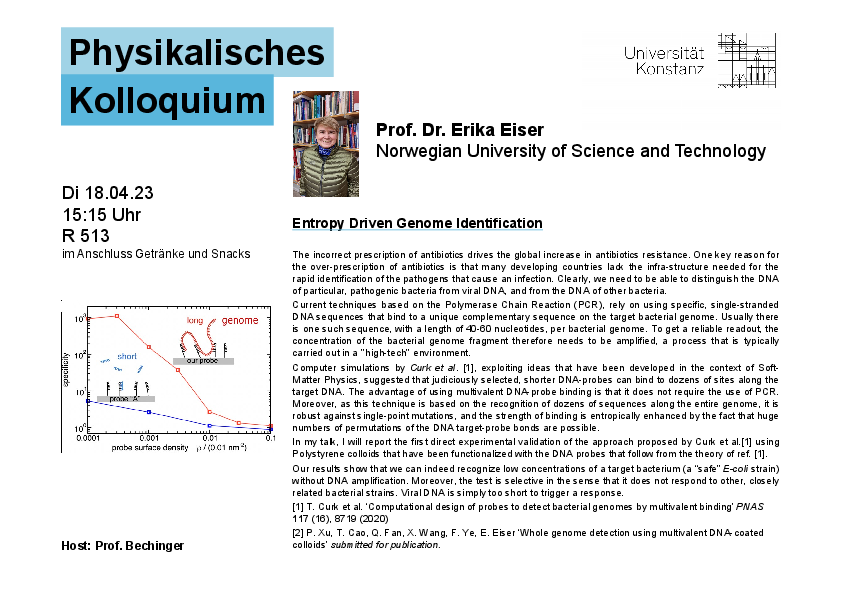Physikalisches Kolloquium: Entropy Driven Genome Identification
Wann
Dienstag, 18. April 2023
15:15 bis 16:45 Uhr
Wo
P 603
Veranstaltet von
FB Physik / Prof. Dr. Clemens Bechinger
Vortragende Person/Vortragende Personen:
Prof. Dr. Erika Eiser, Norwegian University of Science and Technology
The incorrect prescription of antibiotics drives the global increase in antibiotics resistance. One key reason for the over-prescription of antibiotics is that many developing countries lack the infra-structure needed for the rapid identification of the pathogens that cause an infection. Clearly, we need to be able to distinguish the DNA of particular, pathogenic bacteria from viral DNA, and from the DNA of other bacteria. Current techniques based on the Polymerase Chain Reaction (PCR), rely on using specific, single-stranded DNA sequences that bind to a unique complementary sequence on the target bacterial genome. Usually there is one such sequence, with a length of 40-60 nucleotides, per bacterial genome. To get a reliable readout, the concentration of the bacterial genome fragment therefore needs to be amplified, a process that is typically carried out in a ’’high-tech’’ environment. Computer simulations by Curk et al. [1], exploiting ideas that have been developed in the context of Soft-Matter Physics, suggested that judiciously selected, shorter DNA-probes can bind to dozens of sites along the target DNA. The advantage of using multivalent DNA-probe binding is that it does not require the use of PCR. Moreover, as this technique is based on the recognition of dozens of sequences along the entire genome, it is robust against single-point mutations, and the strength of binding is entropically enhanced by the fact that huge numbers of permutations of the DNA target-probe bonds are possible. In my talk, I will report the first direct experimental validation of the approach proposed by Curk et al.[1] using Polystyrene colloids that have been functionalized with the DNA probes that follow from the theory of ref. [1]. Our results show that we can indeed recognize low concentrations of a target bacterium (a “safe” E-coli strain) without DNA amplification. Moreover, the test is selective in the sense that it does not respond to other, closely related bacterial strains. Viral DNA is simply too short to trigger a response.
[1] T. Curk et al. ‘Computational design of probes to detect bacterial genomes by multivalent binding’ PNAS 117 (16), 8719 (2020)
[2] P. Xu, T. Cao, Q. Fan, X. Wang, F. Ye, E. Eiser ‘Whole genome detection using multivalent DNA coated colloids’ submitted for publication.

